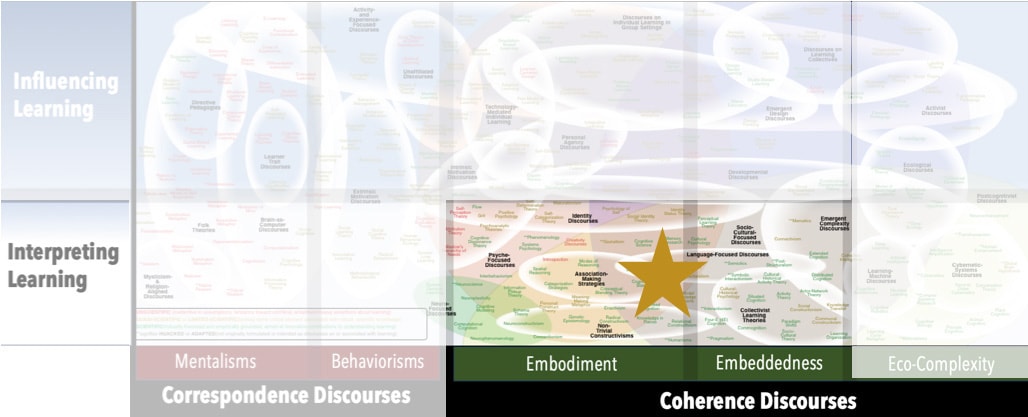Focus
Individual generating meaning in/of social contextsPrincipal Metaphors
- Knowledge is … scope of possible meanings and interpretations
- Knowing is … meaning
- Learner is … a coherence seeker (individual in a collective)
- Learning is … making meaning
- Teaching is … orienting perceptions and juxtaposition experiences
Originated
1940sSynopsis
Within the Meaning-Making Metaphor, learning is interpreted in terms of making sense of self, experience, and relationships. The notion falls short of a theory, but it is often invoked in a manner that suggests it is explanatory. That said, the Meaning-Making Metaphor serves as a component of many theories of learning – especially Embodiment Discourses and some Embeddedness Discourses (where “social meaning-making” is a common research focus). Its popularity among Coherence Discourses is likely linked to the way it implies agency on the part of the learner, as might be illustrated by discourses structured around the metaphor. For example:- Central Coherence Theory (Uta Frith, 1980s) – the proposal that humans are oriented to deriving meaningful coherence of situations, even if that coherence entails ignoring some details
Commentary
The Meaning-Making Metaphor is typically presented/engaged as a literal description (rather than a metaphorical interpretation) of what is going on when learning happens. As such, it lacks some critical elements of a full-blown theory, even though it shares some core assumptions and assertions with prominent Embodiment Discourses and Embeddedness Discourses. Associated discourses include:- Inferentialism (Robert Brandom, 2000s) – a theory of meaning-making that foregrounds the defining premise of Coherence Discourses (i.e., that “meaning” is not a stand-alone phenomenon; it arises in the coherence among elements of a system)
Authors and/or Prominent Influences
Viktor Frankl; Neil Postman; Charles Weingartner; Robert KeganStatus as a Theory of Learning
The Meaning-Making Metaphor is not a theory of learning. Rather than engaging critically with the metaphoric entailments of “meaning-making,” the notion is typically presented/engaged as a literal description of what is going on when learning happens. Lacking such elements, the Meaning-Making Metaphor tends to operate more as a principle of learning – that is, as a metaphor that is invoked by many theories, but that is not a theory in and of itself.Status as a Theory of Teaching
Advocates of the Meaning-Making Metaphor have assembled some fine-grained advice on supporting meaning-making and using it as a focus in a range of contexts, especially ones dealing with social relationship. While not a theory of teaching, then, the Meaning-Making Metaphor has proven to be a useful lens to view, interpret, and inform teaching situations.Status as a Scientific Theory
The Meaning-Making Metaphor is a figurative suggestion that might be taken up by scientific theories, but that itself cannot be construed as a scientific theory.Subdiscourses:
- Central Coherence Theory
- Inferentialism
Map Location

Please cite this article as:
Davis, B., & Francis, K. (2022). “Meaning-Making Metaphor” in Discourses on Learning in Education. https://learningdiscourses.com.
⇦ Back to Map
⇦ Back to List
